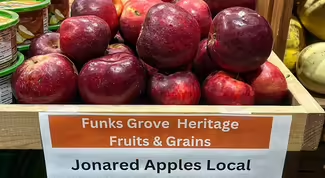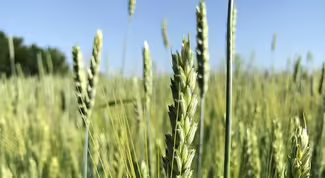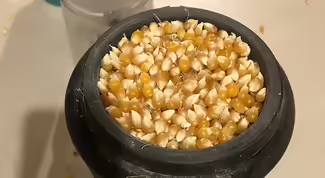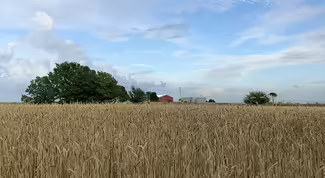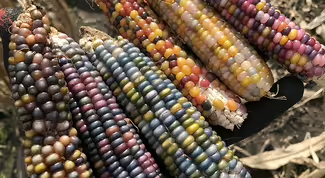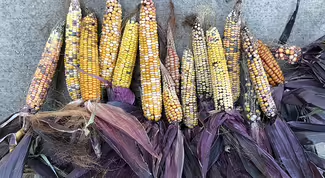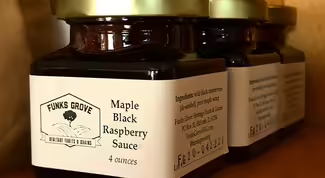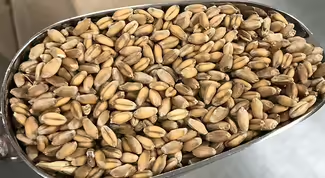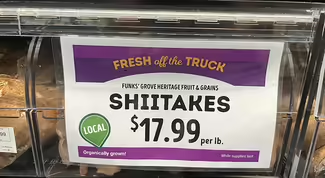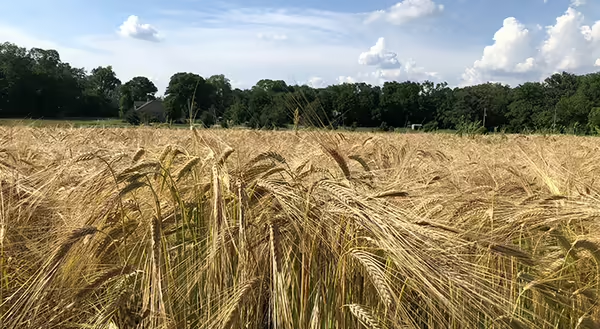
McLean county small farm uses systems-level thinking, small town advocacy, farm business synergy to drive positive change in local food system
Sometimes it is good to take a step back and look at things from the 30,000-foot view, as the saying goes. If we allow ourselves (as farmers, technical service providers, or consumers) to do this, it becomes easier for us to notice – and then troubleshoot or workshop – a regional issue. For example, it’s hard enough for farmers to produce a great crop of tomatoes, green beans, or sweet corn – but then what do they do with the surplus, once the local market is saturated by late summer? Might there be a mutually beneficial, regional solution to this problem?
Prioritizing the higher-level thinking needed to address questions like these in our local food system is much easier said than done. However, systems-level thinking and problem solving is only becoming more important for small farm businesses. One local couple doing their fair share of local food systems thinking (and acting) are Katie Funk and Jeff Hake of McLean, Illinois. They were kind enough to answer my many interview questions on a warm February morning while they pruned their small orchard.
Together with their third business partner, Katie’s brother, Jonathan Funk, they own and operate Funks Grove Heritage Fruits and Grains, growing and foraging a mixture of heirloom grains and fruits in Funks Grove, Illinois on less than 10 acres. Their flagship products include fruit leather, stone ground whole wheat flour, pancake, johnnycake, and muffin mixes, fruit-based sauces, popcorn, seasonings and more!
10 acres of grain is not much to write home about – if grown conventionally. That’s why Funks Grove Heritage Fruits and Grains is choosing to do things differently. With 100% of their crops grown without any synthetic inputs, their farm business is able to thrive thanks to value-adding and farm business synergy. But before understanding their farming methods, it is critical to understand their backstories.
Katie comes from a long line of Funks that have made Central Illinois their home since 1824 – 200 years ago this year! Anybody that has driven through Funks Grove on Route 66 will recognize the Funk name as synonymous with a springtime breakfast table delicacy – Funks Grove Pure Maple Sirup (spelled with an ‘i’, not a ‘y’).
“The Funks have been producing sirup from this old-growth maple grove for over 100 years. Growing up with the maple sirup business and making the maple candy since I was a teenager, I always knew I would want the business to stay a part of my life,” said Katie. But first she got away from it all for a while.
“I went to school at Illinois Wesleyan, and through an internship got a job as an editor with a publishing company in Chicagoland right after I graduated," said Katie. "The work was great, but I didn’t feel at home. I kept bouncing around between apartments, and suburbs. None of them felt right.” Katie returned home in 2010 and bought a house in McLean, Illinois – right down the road from the family sirup shop.
During Katie’s time away, her parents bought a small, 9-acre plot down the road from the sirup shop. “Originally, they had planned to build a small organic winery here. They planted four acres of grapes and had architectural drawings for the building and everything – but they realized that growing grapes organically in Illinois is a huge challenge. Sirup-making and row crop planting back-to-back every early and late spring is challenging enough. Having another product that also would require intensive labor, on top of everything else was too much for our small family business to handle.” So, the grapes were allowed to grow, tended and harvested as time allowed, but the winery ideas were set aside. The rest of the land was planted in alfalfa and mowed for hay, waiting to be something more.
Katie and Jonathan grew up on the family farm, now run by their dad along with Jonathan and their cousin Sean. “They farm about 1000 acres of row crops annually, with about 100 acres now in organic production,” said Katie. Jonathan helped with maple sirup production growing up and acquired mechanical and agronomic skills while helping with the row crop operation. He later earned a degree in ag-business from Illinois State University. This know-how would prove extremely useful later for Funks Grove Heritage Fruits & Grains.
Jeff is not from a farming family, but he had a keen interest in growing vegetables even as a child in Massachusetts, and his parents encouraged his hobby. “My first real farm job was on a farm in Nantucket called Bartlett’s Farm. I was on the picking crew, working with a lot of Eastern Europeans. I learned some Bulgarian and I had a great time!”
While in college, Jeff studied horticulture, but minored in sustainable agriculture and plant science. “I wrote my senior thesis on New England Community Gardens, which had tie-ins to social justice and the anti-war movement. There’s a thread that weaves through people and plants and eventually to the common good of agriculture.” This turned out to be Jeff’s passion. But it took him a while to figure out how he could meaningfully contribute to the local food movement in an impactful way.
He went on to work at a number of farms and related nonprofits in Maine, Massachusetts, and New Hampshire – and eventually got a job as the Farmer Training Program Coordinator with the Land Connection in Champaign, Illinois in 2014. “So, while Katie was apartment and suburb-hopping, I was farm-adjacent job-hopping!” Slowly, he began developing a facilitation, convening, and farm-organizing skill set with the Land Connection.
In 2014, Katie’s brother Jonathan became a partner in the family row crop and maple sirup business, and the siblings began discussing in earnest what could be done with that small, 9-acre plot of land that their parents had purchased some years back. The puzzle pieces that would become FGHFG started to fall into place.
Those 9 acres of ground weren’t convenient to farm with large machinery in the conventional way. It was also across the way from both the sirup production and the rest of the grain fields, so it was a little out of the way. It seemed to ask to be something different.
“In 2015, we started talking about the concept of Funks Grove Heritage Fruits & Grains, and decided we would grow organic small grains for pancake mix to complement Funks Grove Maple Sirup,” Katie recalled. “But we had no idea how to get started.”
The Funks were good friends with another nearby farming family that grew organic grains – the Bishops of PrairiErth Farm in Atlanta, Illinois. Jonathan and Katie sought their advice. Late in 2015 they had dinner with Hans and Katie Bishop, and they were adamant, “Go to the MOSES (now Marbleseed) conference in La Crosse, WI and learn from other farmers!”
Marbleseed – which just had its 35th annual conference – is a farmer-driven, farmer-focused, non-profit organization dedicated to helping Midwestern organic-focused farms of various scales achieve their goals. Their annual conference is a gathering of Midwestern small farmers, technical service providers, nonprofits, industry professionals, academics and others dedicated to furthering Midwest organic, diversified, small-farms production of crops and livestock. It is the place to go to accelerate the learning process for farmers just starting out, like Katie and Jonathan.
“OK, loud and clear, we should go to the conference!” said Katie. However, Marbleseed is always the third week of February – right in the heart of sirup production. “Jonathan couldn’t go, he had sirup work to do, so I went!” And that is how Katie met Jeff.
“Man, I was in a bad mood when we met,” said Jeff. He had recently met the Bishops at a Land Connection program, and had agreed to pick them up, then their friend Katie, then carpool up to the Marbleseed conference. “A snowstorm had made drifts all over the roads. In the few places where there were hedges and trees in fencerows, the driving was fine, but those spots were few and far between. It was so dangerous. I was cursing Earl Butz, the Nixon-era secretary of the USDA, the whole drive over. Thanks for having folks tear out those fencerows, Earl! Anyway, that was her first impression of me. Fortunately, she looked past it!”
Jeff elaborated, “We connected over all things small-farms at the conference, and we had our first date a few weeks after the conference!” After two years of dating, Jeff proposed to Katie during a 2018 Marbleseed conference session. They were married that fall on a perfect fall-weather day in Funks Grove.
Jeff and Katie’s marriage increased the staff of Funks Grove Heritage Fruits and Grains by 50% and added new capacity to the venture. When I asked about the breakdown of farm business responsibility, Jeff replied, “Katie was and remains the brains of the operation. She does the books, organizes orders, and in general keeps us running. She also leads fruit processing and fruit product development. Jonathan has the know-how to manage our crop planning, planting, weed control, harvest, storage, and machine maintenance.” Jeff said that he ends up as the official “everything else guy”. “I find myself in the middle of them – I can run the equipment but I can’t repair it. I can do recordkeeping but I’m not great with accounting. I do a lot more of the product packing, delivery of product, sales, and marketing.” He and Katie split the fruit foraging and kitchen work responsibilities evenly, mainly because that is the most laborious part of their business.
I was interested to know the personal significance of the farm business name, and why fruits and grains (especially small organic grains) was the niche that Katie and Jonathan originally chose. “It just made sense – Jonathan already knew how to grow grains, so we scaled down that know-how and scrounged around for old equipment that he could repair and retrofit to suit our needs. Grains are great too because in theory you can store them for a long while and use them later.”
Katie elaborated that the fruit focus was her passion, borne of a childhood in which she foraged black raspberries on Funks Grove family land. “And in terms of the word ‘heritage’, we wanted to return to an older way of doing things. There has been a general loss of heirloom varieties over the years. We wanted to help stop a trend of variety loss. We wanted to choose a word that would hearken people back to what farming and eating in this area of Illinois might have been like 100 years ago.”
True to their word, their go-to heirloom grain crops are “an Italian flint corn called ‘Floriani’, and a very disease-resistant wheat called ‘Warthog,” said Jeff.
“I guess my interest in farming heirloom varieties in the old ways was related to addressing health issues that were starting to come up in my 20s,” said Katie. I became gluten-sensitive, for example. I started paying attention to where my food came from, and I wanted to be able to say I was contributing to healthier sources of food being available for purchase in our area of Illinois.”
Their Jonnycake mix uses only corn, no wheat. Johnnycakes are basically corn pancakes! They were developed with gluten-sensitive consumers in mind. There is no gluten in corn, so the mix provides a local option for a pancake replacement to go with locally available sirup.
As the farm begins its 9th year, Katie and Jeff’s time commitments look a little different than one might expect. Although they are very much involved in the day-to-day battles of small farm business operations, much of their collective bandwidth is spent on systems-level thinking. Community and economic development, small town resilience, and local foods systems support structures – these are Katie and Jeff’s bread and butter.
I asked them to list their work commitments (paid and unpaid), in addition to their farm business management responsibilities, and was stunned by their answers.
Katie is an almost full-time freelance editor, specializing in dental and medical publishing. She also helps in the production of maple sugar and maple candies for Funks Grove Pure Maple Sirup.
For Jeff's part, he is President of the Central Illinois Young Farmers Coalition and has a contract position with Illinois Stewardship Alliance.
“My work with the Alliance spans across a few different parts of their organizing efforts, and that work is about to expand. I have been facilitating the Illinois Food System Infrastructure Collaborative over the last year, which is a community of practice meant to foster resource-sharing between stakeholders.” He is also getting increasingly involved in their caucus organizing work, taking on a bigger role in their Local Food Farmers Caucus and the burgeoning Food System Leader Caucus.
Jeff also contributes to the maple sirup family operation in various ways – by timber stand thinning, clearing sap lines of fallen trees, and helping with collection and processing of sap.
Katie and Jeff have also co-pioneered many new Funks Grove Maple Sirup products over the years, two of which have recently surged in popularity: walnut sirup and ginger sirup!
The walnut sirup is made by tapping black walnut trees, in the same way you can tap sugar maples. However, they yield a lot less sap, and the Funks have a fraction of the amount of walnut trees compared to their sugar maples. Plus, walnut sap contains a lot of pectin, which needs to be filtered out, and it needs to be processed completely separately from the maple sirup. The result is a delicious but pricey new product, truly unique, and with rich flavor that, according to Jeff, evokes flavors “like a banana nut bread”.
The ginger sirup is a result of buying big bags full of fresh ginger from Fox at the Fork Farm in Monee, IL and cooking it down in dark maple sirup. The result is a sweet, spicy, fragrant sirup variant that has also proved immensely popular.
Katie and Jeff are also President and Vice President of CORE of McLean – a small non-profit focused on bringing more tourism to their village of McLean, Illinois, and increasing the quality of life for people that live there via community and economic development efforts.
Lastly, the couple were integral players in the establishment of FarmFED Collaborative Food Co-op – a cooperatively owned local food processing facility in Mt. Pulaski, Illinois. This last time commitment of theirs pertains to the higher-level regional issue we started with: what to do with excess small-farm produce that is difficult to sell?
FarmFED Collaborative Food Co-op intends to facilitate the movement of surplus fresh produce from local producers to regional institutional buyers by value-adding through processes such as freezing, canning, dehydrating, and more. “Aggregation and processing of surplus farm products is the type of thing our local and regional food system is currently missing – capacity to do things like this is so important,” remarked Katie and Jeff. FarmFED was meant to be operational in 2022 but the pandemic slowed things way down. “The other thing is that we lost a few vegetable farms in the pandemic years that were going to be big contributors to a potential frozen vegetable product line, but we are figuring things out. There is a lot of new funding and new opportunities bubbling up. This year will be our proof-of-concept year!”
I cringed when I thought about working as many hours as Jeff and Katie do. “How do you guys keep all that straight, let alone find balance?” I asked.
“Time management is something we are always working on. A written daily planner helps a lot. Also, when you’re mostly self-employed, that is good motivation to keep track of time worked – especially if you have to figure out how much to pay yourself and how much your time is worth!” The three of us agreed that writing things down – with writing utensils – is essential and satisfying. “We write things down in paper planners even if it’s already on computer calendars. We are tactile people. It feels good to cross things off!”
Katie agreed that given all they’ve signed up for, burnout is a clear and present danger for much of their year, but they do what they can to combat it. “We love fires in our fireplace, board games, and doing puzzles. Jeff does most of the cooking and he always manages to make a good meal with a lot of local ingredients after many long days. We try to get away a couple times a year too.” They – like many in the world of small farms – are trying to figure out how to do less while achieving more.
Funks Grove Heritage Fruits & Grains and small farm businesses like theirs are operating at a time of more support for operations like theirs than there has ever been.
Gaps in local and regional food economies in Illinois have been identified, and three major funding opportunities have come out that will begin to address them. All three of these funding sources are closed to applications (for now), but the money awarded through these programs will quickly begin to make a positive impact.
The first is the Local Food Purchasing Assistance Program. The Illinois Department of Agriculture is expected to use $28 million from the federal American Rescue Plan to purchase regionally grown, minimally processed food crops directly from Illinois farmers for consumption by clients of state-run institutions. The program was created to strengthen state food systems, support socially disadvantaged farmers and producers, and ensure fresh foods are distributed to underserved communities. The University of Illinois Extension is providing facilitation of this process and will provide technical assistance going forward, and awardee organizations have been announced.
The second and third funding opportunities are the Illinois Local Food Infrastructure Grant and Resilient Food Systems Infrastructure Program. Together, they represent a collective $8.4 million dollars specifically dedicated to strengthening the state’s regional food supply chains by funding on-farm infrastructure projects that result in improvements between harvest and point-of-sale. 10 years ago, farmers could only dream of funding opportunities like these, but they are now a reality.
“We’re thrilled to say that we successfully received funding through the Local Food Infrastructure Grant,” said Jeff. “Our friend Andy Hazzard of Hazzard-Free Farms in Northern Illinois is currently milling our grain for us. She has also cleaned our grain on her gravity table, a specialized grain cleaner that sorts by weight. Using that grain cleaner, she has saved our harvests from the compost pile multiple times now. We need small-scale grain-handling equipment on site (in McLean) if we ever hope to expand our farm from a few acres. This new funding will help us do the first step of that, and we have also applied to the Resilient Food System Infrastructure Grant which would help us fully build out a grain handling and milling facility right on our farm.”
The number of Illinois conventional grain growers is one number – and the number of Illinois organic grain growers is a much smaller number. The number of Illinois organic grain growers growing on small acreage and value-adding to create things like rolled and steel-cut oats, bread flour, pancake mix, and other food-grade grain products is very small - but slowly growing.
I wondered aloud where those growers should go to connect with their fellow small grains farmer-enthusiasts. Jeff offered that “the Artisan Grain Collaborative (AGC) and Midwest GRIT are phenomenal resources. It can be isolating to do this type of work – until you attend one of those meetings or field days. It’s hard to put into words how empowering it is to meet a group of farmers trying to do the same thing you are.”
I asked Jeff and Katie what University of Illinois Extension could do for small, artisan, value-added grain and fruit farmers like them that would be most helpful. “Being out here in the field with us, giving technical service tips on fruit tree pruning while helping to tell our story is pretty darn helpful!” said Katie. “Hands-on workshops are always appreciated,” Jeff added, from the top of his pruning ladder.
Katie then shared that she was planning to attend a stone-milling course in North Dakota the following week as a result of a scholarship from AGC. “It would be great if growers like us didn’t have to drive all the way to North Dakota to learn how to use a stone mill.” I noted that Illinois Extension has contacts throughout the state that may be able to facilitate a similar curriculum in the future. Another option I suggested was for Illinois Extension to hire an Organic Grains Statewide Specialist. “That would be a great start!” said Jeff.
I asked Katie and Jeff what their favorite way was to eat the fruits (or grains!) of their labor. Katie’s vote was their decadent maple black raspberry sauce, which she especially enjoys on Johnnycakes. Jonathan says he most enjoys their Floriani cornmeal in cornbread and their Warthog wheat in pancakes. Jeff said he particularly loves a good sandwich - with bread made from their flour. What he did not say is that he is a sandwich artisan, posting stunning, bistro-quality pictures of sandwiches several times a week on social media, featuring local cheeses, breads, meats, condiments and more.
Considering that “local food systems” is the first and longest half of my job title, “Local Food Systems & Small Farms Educator”, I think about it a lot. Sometimes it is hard to imagine what it looks like or feels like, but I know it when I see it or hear it. And to talk to Katie Funk and Jeff Hake is to be immersed in it. As a final parting thought, Jeff had this to share.
“Farming was never meant to be a solitary act. Growers are an inherent part of their community, supporting it at its most fundamental level by growing food. We should not be expected to do this work alone, but the idea of the strong, independent farmer is advantageous for those who would replace the contributions and expertise of neighbors with commodities to be purchased and applied. Illinois can and should grow a large part of its own food, and a huge part of that food supply should be food-grade grains. But the entire food-grade grain chain has been eroded by decades-long waves of policy and economics that have been hostile to small-acreage farmers. We and farmers like us intend to rebuild what has been lost and create a better culture, diet, and future rooted in authentic local grain production.”
The next day, I made a sourdough bread loaf with ‘Warthog’ wheat, milled into whole grain flour, grown in Funks Grove, Illinois - 14 miles from my house. The flavor I encountered was a strong reminder to keep advocating for Central Illinois small grains farms – one sourdough bread loaf at a time.
